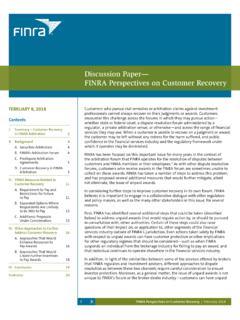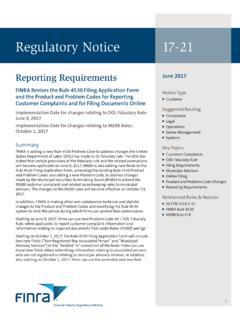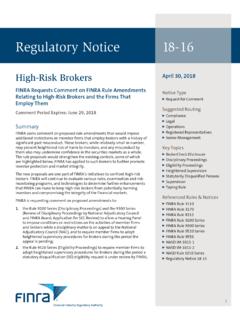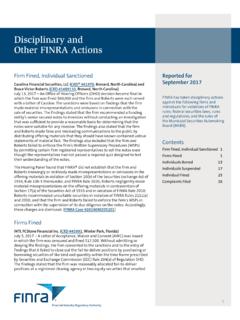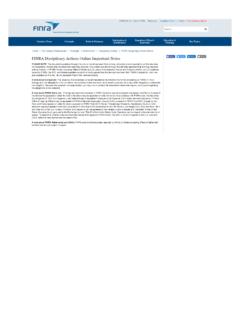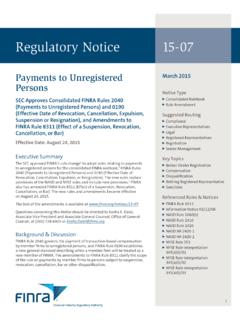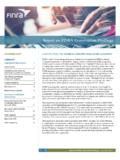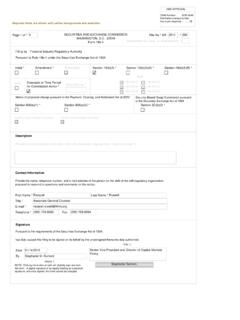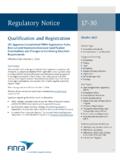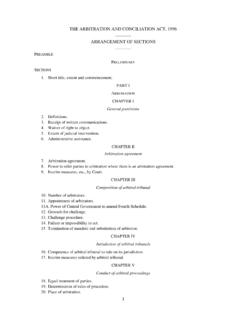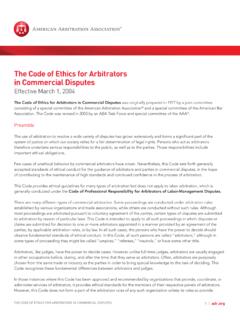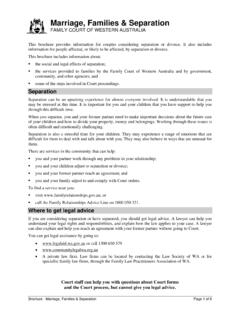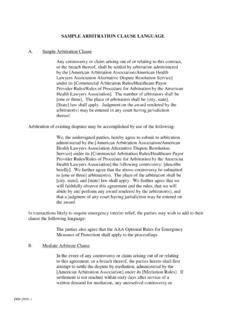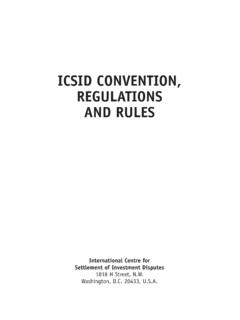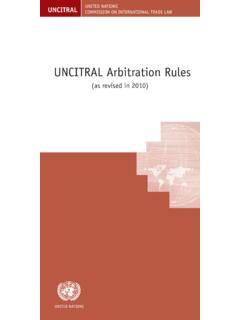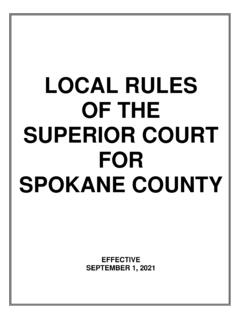Transcription of FINRA Dispute Resolution Services Arbitrator’s Guide
1 333333further FINRA Office of Dispute Resolution Arbitrator s Guide This Guide contains important information about FINRA Office of Dispute Resolution Services , policies and procedures. For additional information, please go to our website: or call one of our regional offices. FINRA Office of Dispute Resolution attempts to present information to readers in a format that is easily understandable. However, please be aware that, in case of any misunderstanding concerning a rule in the Customer or Industry Code of Arbitration Procedure, the rule language prevails. March 2018 Edition Copyright 2018 FINRA , Inc. All Rights Reserved. 2 Table of Contents This Guide contains important information about FINRA Office of Dispute Resolution Services , policies and procedures. For additional information, please go to our website or call one of our regional offices. Part One: Overview .. 9 About the Arbitration Process .. 9 About FINRA .. 10 About FINRA Office of Dispute Resolution .
2 10 FINRA s Administrative Staff .. 10 About FINRA arbitrators .. 11 Arbitrator Honorarium .. 11 FINRA s Guidelines on Reimbursement for Expenses .. 12 Part Two: Arbitrator Training .. 13 Basic Arbitrator Training Program .. 13 Advanced Arbitrator Training .. 13 Continued, Mandatory Training .. 13 Part Three: The Arbitrator s Role Ethical Considerations, Duty to Disclose, Challenges and Disqualification .. 14 The Arbitrator s Role: Ethical Considerations .. 14 Neutrality .. 14 Avoiding Potential Conflicts .. 14 Ethical Reasons Not to Accept Appointment as an Arbitrator .. 14 Ethical Obligations Regarding Information Security .. 15 Copyright 2018 FINRA , Inc. All Rights Reserved. 3 The Arbitrator s Role: Duty to 17 Disclosures Upon Appointment to Serve .. 18 Disclosures After Appointment to Serve .. 18 Disclosures at Hearings .. 18 Disclosures in General .. 18 The Arbitrator s Role: Challenges and 19 Motions to Recuse .. 19 Challenges for Cause Before the First Hearing Session Begins.
3 20 Director s Authority to Remove an Arbitrator After the First Hearing Session Begins .. 22 Additional Resources .. 22 Part Four: Before the Proceedings Begin .. 23 Determine Whether There Is a Senior or Seriously Ill Party Involved .. 23 Discovery Deadlines .. 23 Scheduling the Hearing .. 23 Adjournments .. 24 Direct Communication .. 24 Decisions .. 24 Consider Using the Direct Communication Rule .. 24 Additional Resource .. 25 Part Five: Prehearing Conferences .. 26 The Initial Prehearing Conference .. 26 Preparing for the Initial Prehearing Conference .. 26 Conducting a Fair and Impartial Initial Prehearing Conference .. 27 Copyright 2018 FINRA , Inc. All Rights Reserved. 4 Opting Out of the Initial Prehearing Conference .. 27 Other Prehearing Conferences .. 27 Make Preliminary Introductions .. 28 Address the Issues .. 28 Make Rulings .. 28 Follow-Up .. 28 Additional Resource .. 29 Part Six: Discovery .. 30 Discovery .. 30 Discovery Guide .. 30 Responding to Document Requests.
4 31 Ruling on Discovery .. 31 Production Orders That May Require 32 Production Orders That Do Not Require Subpoenas .. 32 Depositions and Information Requests .. 33 Confidentiality and Discovery .. 33 Product Cases .. 34 Electronic Discovery .. 37 Format of E-Discovery .. 37 Reasonably Usable Document Production .. 39 Examples of Reasonably Usable Document Production .. 39 Factors to Consider When Resolving E-Discovery disputes .. 40 Document Sources and Search Terms .. 41 Copyright 2018 FINRA , Inc. All Rights Reserved. 5 Modifications to Electronic Files .. 41 Discovery Sanctions .. 42 Additional Resources .. 42 Part Seven: Motions .. 43 Panel s Authority to Rule on 43 Types of Motions .. 43 Motion to Amend a Claim .. 43 Motion to Consolidate Claims .. 44 Motion to Sever Claims .. 44 Motion to Change the Hearing Location .. 44 Motion to Bar Defenses Due to Untimely or Incomplete Answers .. 45 Motion to Compel Discovery .. 45 Motion to Postpone a Hearing.
5 45 Motions to Dismiss .. 47 Motion in Limine .. 51 Additional Resources .. 51 Part Eight: Before the Evidentiary Hearing .. 52 Preparing for the Evidentiary Hearing .. 52 Offsite Hearing Locations Guidance .. 52 Part Nine: During the Evidentiary Hearing .. 53 Before the Hearing Starts .. 53 Parties .. 53 Counsel .. 53 Copyright 2018 FINRA , Inc. All Rights Reserved. 6 Witnesses .. 54 Starting the Hearing .. 54 Hearing Decorum .. 55 Avoiding Ex Parte Communications .. 55 Using the Hearing Script .. 56 Record of the Hearing .. 56 The Parties Presentations .. 57 Admissibility of Evidence During the Party s Presentation .. 58 Exclusion of Evidence During the Party s Presentation .. 58 Issuing Sanctions .. 59 Questions by arbitrators and Factual Investigations .. 60 Rulings Made During the Hearing .. 60 Executive Sessions .. 60 Concluding the Hearing: Ascertaining the Final Damage Requests .. 61 Exiting the Hearing Room .. 61 Proper Disposal of Case-Related Materials.
6 61 Hints for the Chairperson .. 62 Additional Resources .. 62 Part Ten: After the Evidentiary Hearing .. 63 Deliberations .. 63 Rendering the 64 Form of the Award .. 64 Explained Decisions .. 65 Copyright 2018 FINRA , Inc. All Rights Reserved. 7 Types of Remedies .. 65 Actual Damages and/or Statutory Damages .. 65 Other Remedies .. 66 Requests to Include Interest as Part of the Award .. 67 Requests to Include Punitive Damages as Part of the Award .. 68 Awarding Sanctions, if Any .. 68 Awarding Fees and Costs .. 69 Forum Fees .. 69 Attorneys Fees .. 70 Witness and Production Fees .. 70 Other Case-Related Costs .. 70 Member Surcharge and Process Fees .. 71 Arbitration Award Offsets .. 71 Expungement of Customer Dispute Information .. 71 Central Registration Depository .. 71 Reporting Requirements .. 72 Role of arbitrators in Expungement Cases .. 72 Expungement Rules .. 73 Settled Cases .. 74 Expungement-Only Cases .. 76 BrokerCheck Report Review .. 76 Awards and Expungements.
7 77 Expungement in Intra-Industry disputes .. 78 Copyright 2018 FINRA , Inc. All Rights Reserved. 8 Parties Making Second Requests for Expungement .. 78 Additional Resources .. 78 Part Eleven: After the Case Closes .. 79 Avoiding Party Contact .. 79 Party Submissions to arbitrators After a Case Closes .. 79 Maintaining Confidentiality .. 79 Arbitrator Immunity .. 80 Evaluating arbitrators .. 80 Making Disciplinary Referrals .. 80 Post-Case Referral .. 80 Mid-Case Referral .. 81 Motions to Vacate an Award .. 82 Part Twelve: Simplified Cases .. 83 Frequently Asked Questions for Simplified Cases .. 83 Additional Resource .. 86 Copyright 2018 FINRA , Inc. All Rights Reserved. 9 PART ONE: OVERVIEW About the Arbitration Process Arbitration is a method of resolving a Dispute between two or more parties. Parties agree in advance to abide by the decision of the arbitrators , who are impartial persons committed to rendering a fair and impartial decision after all parties have had an opportunity to present their cases.
8 The arbitrators ' award is final and binding, subject to court review only under limited circumstances. There is no appeal process within FINRA under the Code of Arbitration Procedure for Customer disputes or the Code of Arbitration Procedure for Industry disputes (collectively referred to as Codes or Code).1 However, the parties may file a motion to vacate the arbitration award in a court of competent jurisdiction. In short, arbitration is a quick, fair, and relatively inexpensive alternative to litigation. There has been a dramatic increase in the use of arbitration for all types of disputes since the late 1980s. A sharp increase in the number of securities arbitrations was influenced by a Supreme Court decision (Shearson v. McMahon, 1987) that helped establish arbitration as the predominant procedure for resolving securities disputes . Prior to this decision, the binding nature of the arbitration agreement and the broad scope of an arbitrator's authority in securities cases were less clear.
9 Since arbitration is the primary means of resolving disputes in the securities industry, the public perception of its fairness is of paramount importance. arbitrators appointed to resolve securities controversies must continue to meet the challenge of maintaining fair and orderly arbitration proceedings. 1 Because many of the rules in the Code of Arbitration Procedure for Customer disputes (Customer Code) and the Code of Arbitration Procedure for Industry disputes (Industry Code) are identical, this Guide focuses primarily on the Customer Code (12000 series). Where there is a significant difference between the Customer Code and the Industry Code, the Guide will refer to the appropriate rule in the 13000 series of FINRA s Industry Code. Equity is justice in that it goes beyond the written law. And it is equitable to prefer arbitration to the law court, for the arbitrator keeps equity in view, whereas the judge looks only to the law, and the reason why arbitrators were appointed was that equity might prevail.
10 Domke on Aristotle Copyright 2018 FINRA , Inc. All Rights Reserved. 10 About FINRA The Financial Industry Regulatory Authority ( FINRA ) is the largest independent regulator for all securities firms doing business in the United States. FINRA was created in July 2007 through the consolidation of NASD and the member regulation, enforcement and arbitration operations of the New York Stock Exchange. FINRA s mission is to protect America s investors by making sure the securities industry operates fairly and honestly. FINRA touches virtually every aspect of the securities business from registering and educating industry participants to examining securities firms; writing rules; enforcing those rules and the federal securities laws; informing and educating the investing public; providing trade reporting and other industry utilities; and administering the largest Dispute Resolution forum for investors and registered firms. FINRA also provides Dispute Resolution Services for exchanges that do not operate their own Dispute Resolution program.
